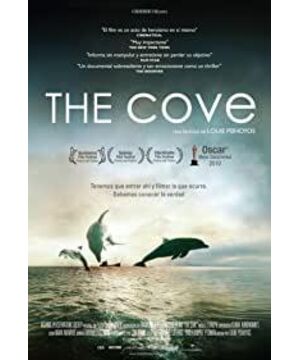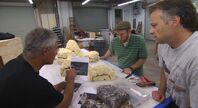is accompanied by the last sentence of the documentary. Richard is a lonely figure standing on the bustling streets of Japan with a screen on his back. What is playing on the screen is the massacre at the end of the film.
If there was no massacre, Dolphin Bay would have been a beautiful and peaceful blue bay. However, the slaughter began. With the desperate voice and struggle of the dolphins, the sea water was gradually rendered with blood, and the ocean surface slowly calmed down. The killers used hooks to stab the dolphin's body and drag it onto the whaling boat. A slaughter segment of no more than 5 minutes, the air-conditioning came out of every pore, making people feel shivering. They discuss slaughtering cetaceans as easily as they discuss killing a chicken for dinner.
"Dolphin smile" is one of the biggest lies in the world. Cathy the dolphin committed suicide because she couldn't bear the enormous pressure. After taking her last spontaneous breath, she chose to die, in Richard's arms. Dolphins rely on sonar as a tool for communication, and they can use the sound in the water to know your breathing, your bones, whether you are pregnant. They are at the top of the food chain in the ocean and, like humans, have self-awareness and advanced intelligence — maybe even smarter than us. They are eager to communicate with human beings. What a warm scene of divers and dolphins dancing and interacting with dolphins in the water! What right do human beings have to kill creatures who are also on this beautiful planet? Taking it to an extreme, how is this different from the Nazis' genocide policy? Is it just because that cetacean in Japan is a ridiculous argument that the loss of marine life has led to a decline in fishing?
Don't be narrow-minded. This is also a voice that this documentary conveys to us. Whaling is not a Japanese tradition. What is tradition? Traditions must be recognized by the entire nation. However, in interviews on the streets of big cities in Japan, we can see that most people do not know about this, and in supermarkets and other sales terminals, dolphin meat is marked as whale meat.
At the end of the film, some things are explained. For example, the vice president of the Japan Fishing Association was fired in 2009, and his hair sample was tested positive for mercury poisoning; canceled in China; for example, Japan has wooed the list of backward countries to push its whaling agenda. The final picture is the "TAIJI" dolphin slaughter farm, which is indeed a beautiful and peaceful harbor when the slaughter doesn't happen. The slaughter starts every September, unless we can stop it. . . UNLESS YOU STOP IT These few white capital letters appear on the black screen, YOU makes us think, what can we do for this matter.
There is nothing I can do, except to let more people watch this great documentary, knowing that there is a small town called "TAIJI" in Japan, where there is a harbor where dolphins are slaughtered, and cetaceans pass by here every year, None were spared. Knowing that such a group of people has put in so much hard work and great risk to stop Japan's whaling operations for huge commercial profits.
Salute to those who are committed to protecting cetaceans and fighting the Japanese whaling industry!
View more about The Cove reviews










